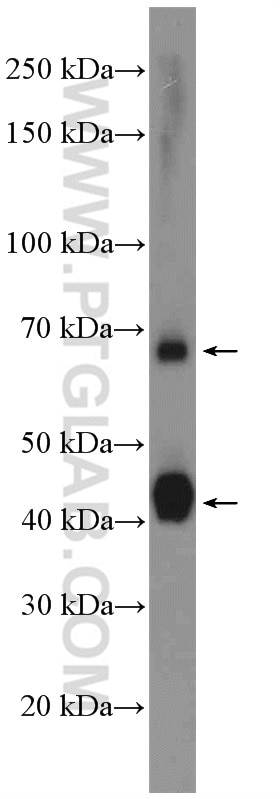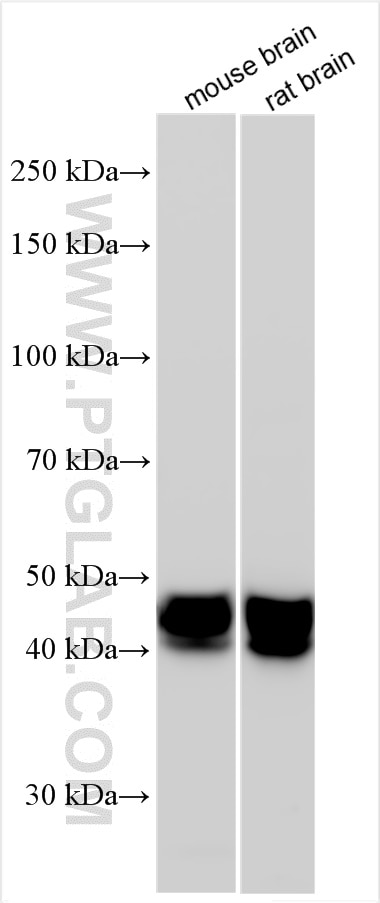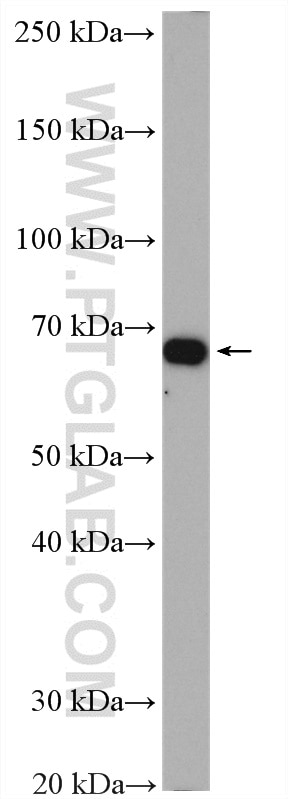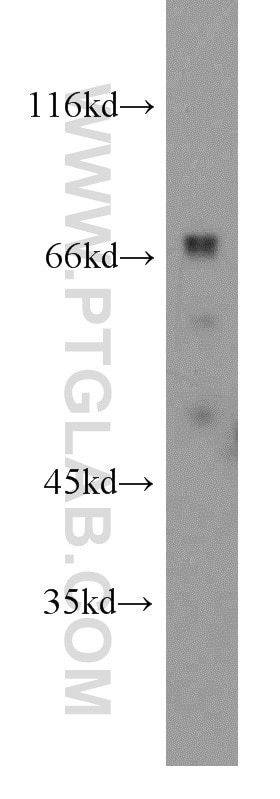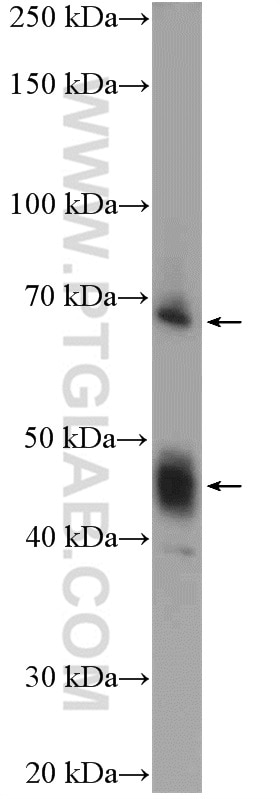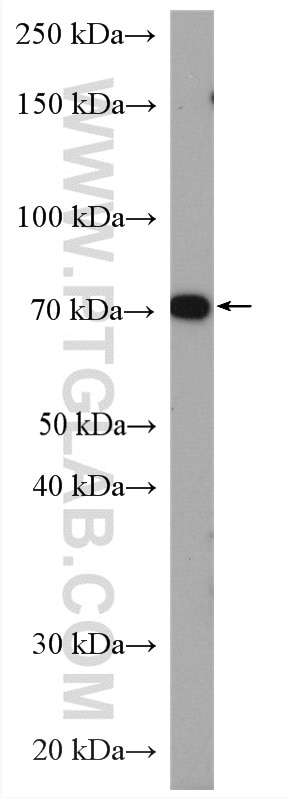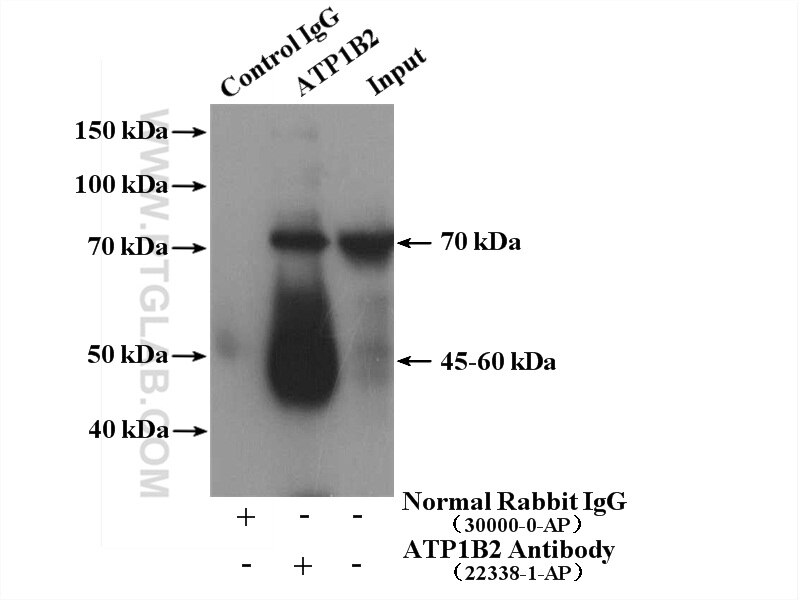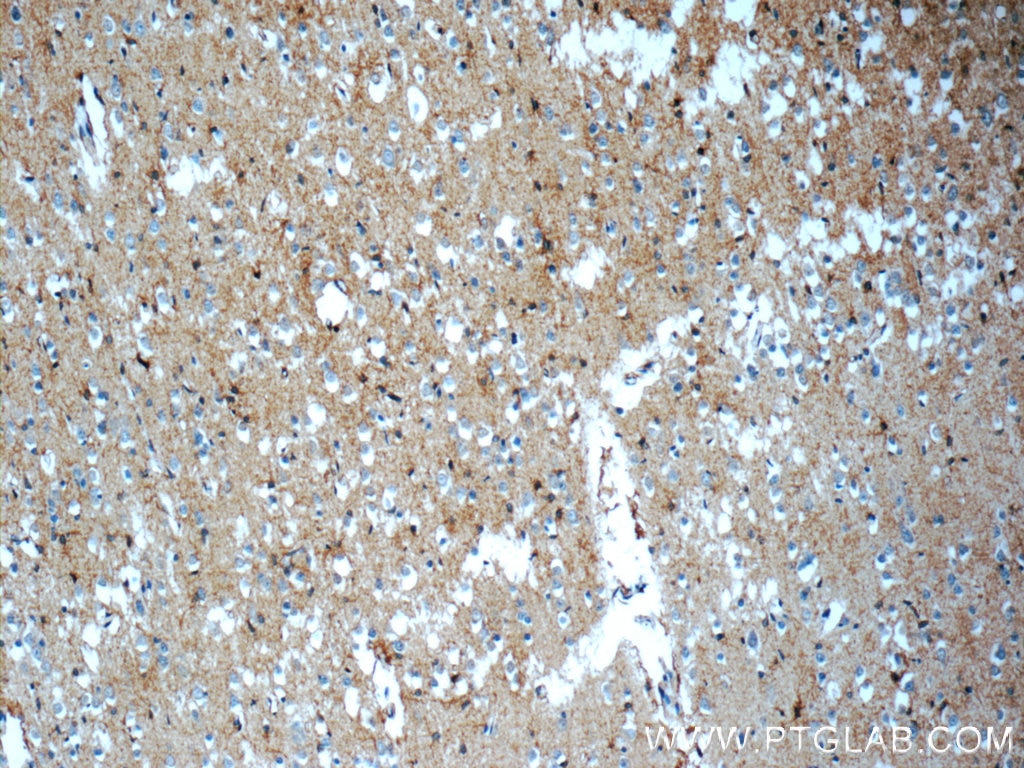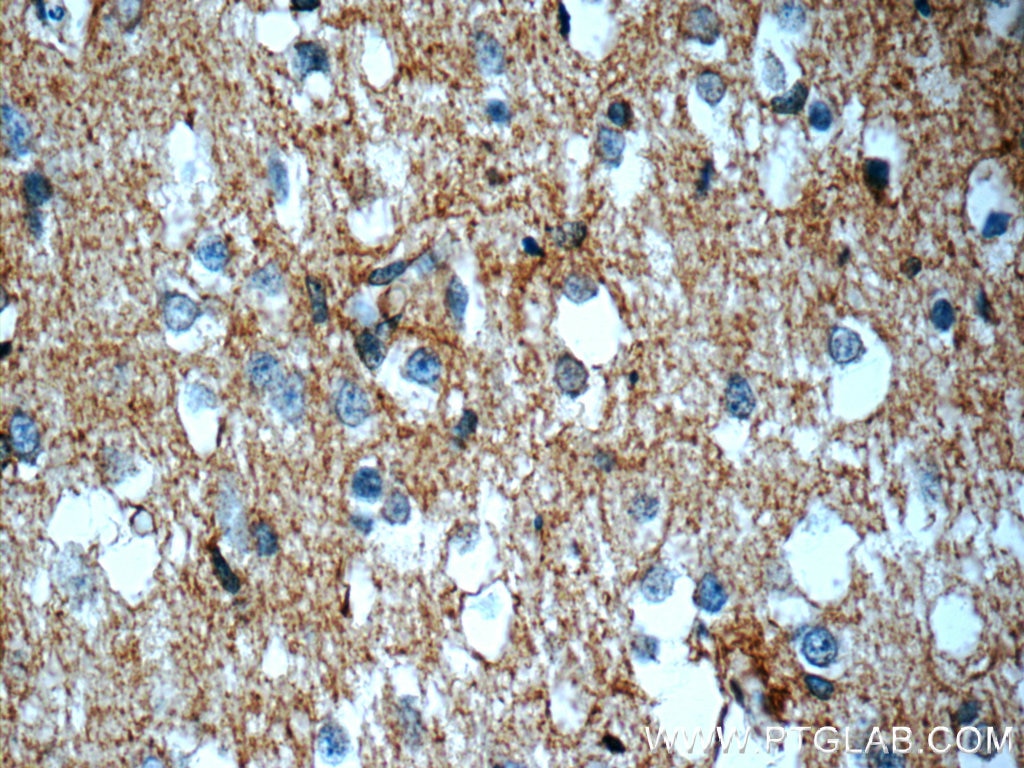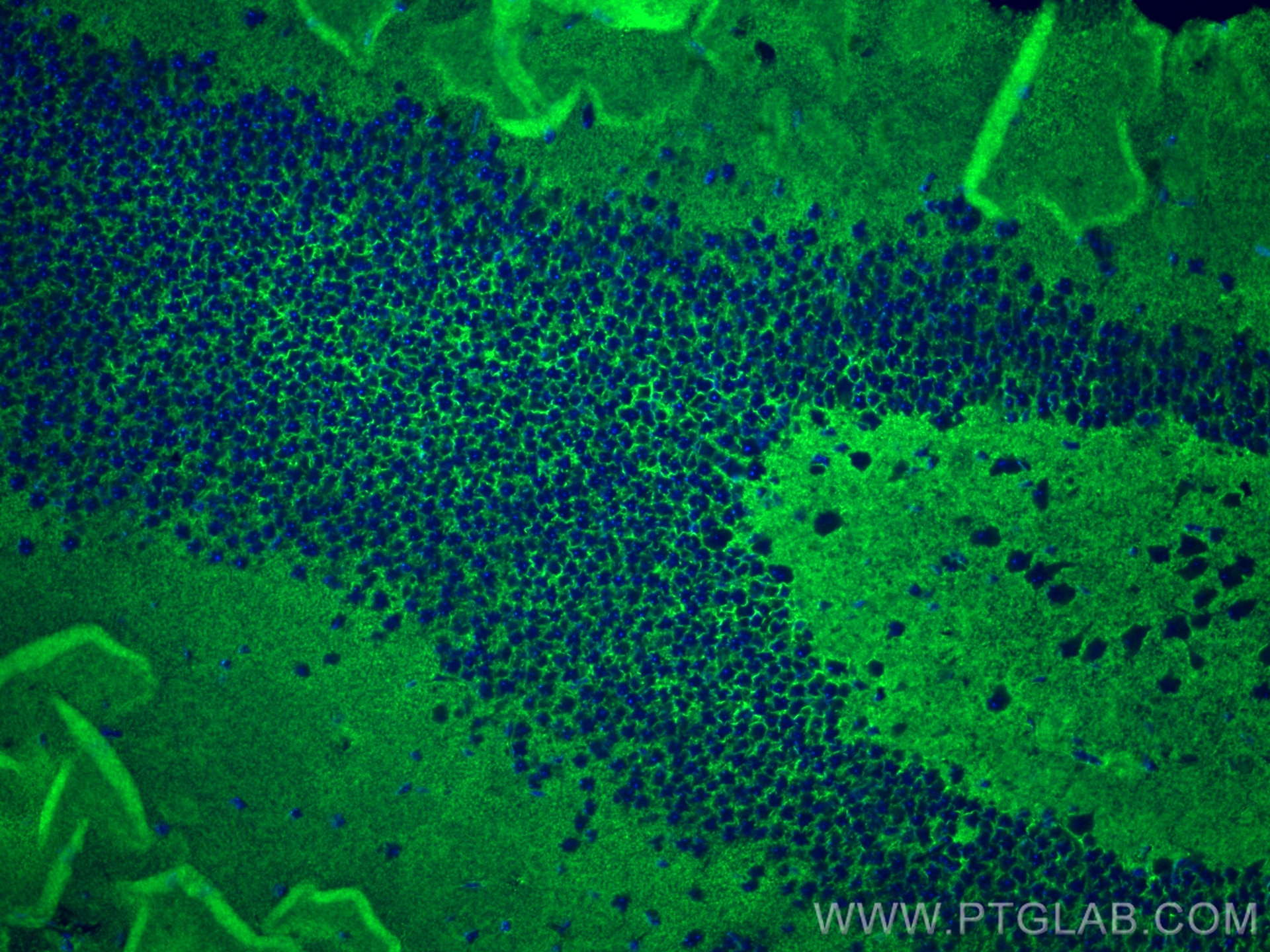Tested Applications
| Positive WB detected in | mouse brain tissue, C2C12 cells, C6 cells, mouse skeletal muscle tissue, rat brain tissue |
| Positive IP detected in | mouse skeletal muscle tissue |
| Positive IHC detected in | human brain tissue Note: suggested antigen retrieval with TE buffer pH 9.0; (*) Alternatively, antigen retrieval may be performed with citrate buffer pH 6.0 |
| Positive IF-P detected in | mouse brain tissue |
Recommended dilution
| Application | Dilution |
|---|---|
| Western Blot (WB) | WB : 1:5000-1:50000 |
| Immunoprecipitation (IP) | IP : 0.5-4.0 ug for 1.0-3.0 mg of total protein lysate |
| Immunohistochemistry (IHC) | IHC : 1:20-1:200 |
| Immunofluorescence (IF)-P | IF-P : 1:50-1:500 |
| It is recommended that this reagent should be titrated in each testing system to obtain optimal results. | |
| Sample-dependent, Check data in validation data gallery. | |
Published Applications
| WB | See 10 publications below |
| IF | See 2 publications below |
Product Information
22338-1-AP targets ATP1B2 in WB, IHC, IF-P, IP, ELISA applications and shows reactivity with human, mouse, rat samples.
| Tested Reactivity | human, mouse, rat |
| Cited Reactivity | human, mouse, rat |
| Host / Isotype | Rabbit / IgG |
| Class | Polyclonal |
| Type | Antibody |
| Immunogen |
CatNo: Ag17818 Product name: Recombinant human ATP1B2 protein Source: e coli.-derived, PGEX-4T Tag: GST Domain: 64-171 aa of BC126175 Sequence: QTVSDHTPKYQDRLATPGLMIRPKTENLDVIVNVSDTESWDQHVQKLNKFLEPYNDSIQAQKNDVCRPGRYYEQPDNGVLNYPKRACQFNRTQLGNCSGIGDSTHYGY Predict reactive species |
| Full Name | ATPase, Na+/K+ transporting, beta 2 polypeptide |
| Calculated Molecular Weight | 290 aa, 33 kDa |
| Observed Molecular Weight | 45-65 kDa |
| GenBank Accession Number | BC126175 |
| Gene Symbol | ATP1B2 |
| Gene ID (NCBI) | 482 |
| RRID | AB_2879077 |
| Conjugate | Unconjugated |
| Form | Liquid |
| Purification Method | Antigen affinity purification |
| UNIPROT ID | P14415 |
| Storage Buffer | PBS with 0.02% sodium azide and 50% glycerol, pH 7.3. |
| Storage Conditions | Store at -20°C. Stable for one year after shipment. Aliquoting is unnecessary for -20oC storage. 20ul sizes contain 0.1% BSA. |
Background Information
ATP1B2 is the β2 subunit of Na+/K+-ATPase which is an essential membrane-bound enzyme responsible for the transport of Na+ and K+ in most eukaryotic cells. ATP1B2 is also called the adhesion molecule on glia (AMOG) and it is highly expressed in normal glia. It is a heavily glycosylated protein that plays a role in cellular adhesion in the CNS. Recently differential expression of ATP1B2 has been found in some glioneuronal tumors (PMID: 23887941, 19371356). This antibody recognizes the endogenous ATP1B2 protein in human brain. The bands between 45 kDa and 65 kDa represent the glycosylated forms of ATP1B2 in different levels (PMID: 8918259).
Protocols
| Product Specific Protocols | |
|---|---|
| IF protocol for ATP1B2 antibody 22338-1-AP | Download protocol |
| IHC protocol for ATP1B2 antibody 22338-1-AP | Download protocol |
| IP protocol for ATP1B2 antibody 22338-1-AP | Download protocol |
| WB protocol for ATP1B2 antibody 22338-1-AP | Download protocol |
| Standard Protocols | |
|---|---|
| Click here to view our Standard Protocols |
Publications
| Species | Application | Title |
|---|---|---|
Cell Mol Gastroenterol Hepatol Self-renewing Monolayer of Primary Colonic or Rectal Epithelial Cells. | ||
Redox Biol Caveolin 1-related autophagy initiated by aldosterone-induced oxidation promotes liver sinusoidal endothelial cells defenestration. | ||
Cancer Cell Int Spider venom components decrease glioblastoma cell migration and invasion through RhoA-ROCK and Na+/K+-ATPase β2: potential molecular entities to treat invasive brain cancer. | ||
World J Biol Psychiatry Altered expression levels of miR-144-3p and ATP1B2 are associated with schizophrenia. | ||
Eur J Appl Physiol Resistance training upregulates skeletal muscle Na+, K+-ATPase content, with elevations in both α1 and α2, but not β isoforms. | ||
Neurosci Lett Effects of icariin on alleviating schizophrenia-like symptoms by regulating the miR-144-3p/ATP1B2/mTOR signalling pathway |

